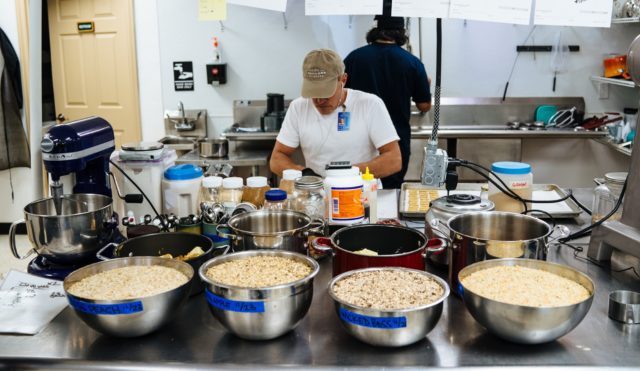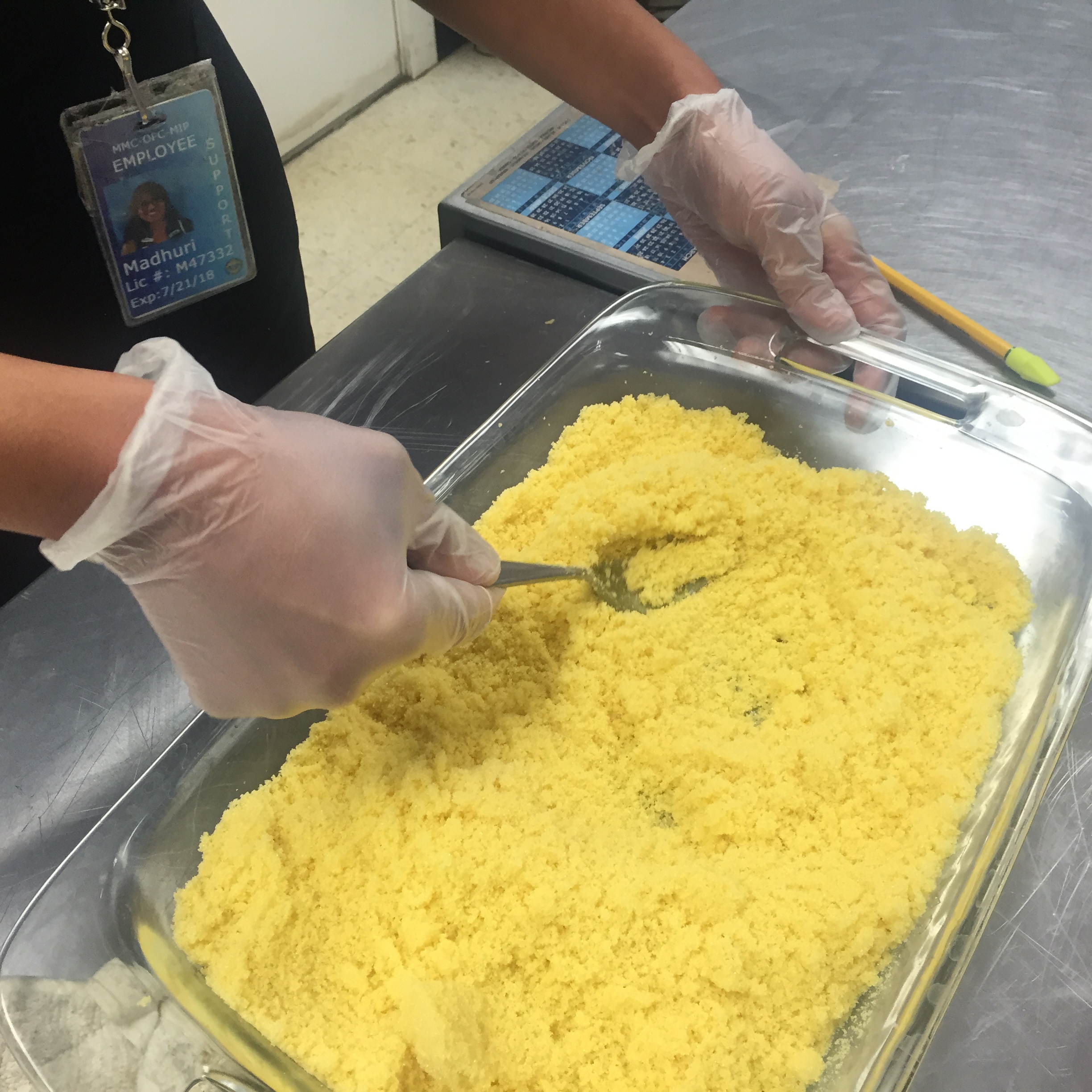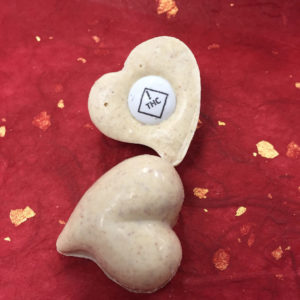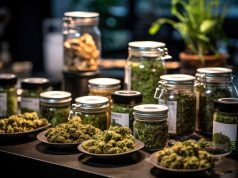
Sweet Mary Jane Bakery — tucked covertly in an East Boulder industrial complex — smells and sounds like a holiday family gathering. Warm, rich, chocolaty aromas rise above the merry chitchat and hustle-bustle. There are two long tables in the center, separated by a few feet, with three or four people working along each side. Two men in front of me squish delicious-looking balls of peanut butter goop between two pretzels. There’s barely a trace of weed in the air.
This could be any old family-run bakery except for the security cameras positioned throughout the room; the official government-issued badges swinging from everyone’s necks; the covered windows; the giant steel refrigerators equipped with padlocks.
Karin Lazarus, the founder and mastermind behind Sweet Mary Jane Bakery, gently touches my elbow as I take it all in. “Emma! Welcome!” She’s a small woman with full bangs that brush her round tortoise-shell glasses. In 2013, The New York Times Magazine deemed her “the Martha Stewart of weed baking.” (But now that Martha has made weed brownies with Snoop Dogg, Martha Stewart is kind of the Martha Stewart of weed baking.)
As we walk around, Karin points out the divided production lines — one table produces medical products and the other recreational. Different regulations for medical and recreational marijuana denote that she must make, label and package the products separately. Around a row of supplies, two men sit at a third table in the “tincture corner” creating a variety of cannabinoid extract and oil blends.
This is the seventh year Sweet Mary Jane Bakery has been producing small-batch, high-end cannabis edibles. Her creations, which have won numerous awards (bookmark her OMG! Brownie Cheesecake Bars and Key Lime Kickers to try later), have also been featured in listicles with titles like BuzzFeed’s “17 Pretty Weed Things for People Who Love Pintrest and Pot” and Rooster’s “27 Weed-themed products to complete your 420 lifestyle.” Now that the bakery distributes its desserts to more than 100 dispensaries across the state and sells more than 2,000 “delightfully infused treats” every week, Sweet Mary Jane Bakery has become a marijuana household name.
Only last year the bakery started baking recreational products.
“I really love the medical side of this business,” Karin says, as her focus has always been on coupling her love of baking with her unwavering belief in cannabis’ health benefits. “But after learning about how recreational was moving forward… there are tons of rec ‘patients’ now, people who have various reasons for not having red cards and just want to be able to buy and use products.”
Cannabis’ medicinal properties have been increasingly well-documented in university and national health laboratories over the course of the past half-century. The three most common ways to ingest cannabis — raw, dried and aged, or extracted — all deliver antioxidant, anti-inflammatory and neuroprotective properties. The Center for Medicinal Cannabis Research based at the University of California in San Diego, for one, has determined that inhaling cannabis can alleviate both physical and psychological illnesses, such as menstrual cramps, fibromyalgia, headaches and migraines, anxiety, Post-Traumatic Stress Disorder, depression and asthma, among numerous others.

In Sweet Mary Jane’s industrial kitchen, all 15 employees introduce themselves and explain the task for which they’re responsible. I can’t keep any names straight. There is too much to take in: ovens, racks of cookie sheets, giant bowls, rows of eggs, bags of candy, lots of packaging. Everyone seems to be best friends. I keep eyeing those peanut butter pretzel sandwiches, known to her medical customers as True Confections. Later they’re dipped in dark chocolate and then drizzled with white chocolate.
I catch glimpses of thick, fudgy brownies on the medical table as a woman slides them into large opaque bags. She laughs with a man across the table who is dividing sets of four mocha latte truffles into hard black plastic containers before snapping down the child-proof lids. Behind me, another man pushes a white M&M-like candy into each cookie on the table. I look closer. Instead of the traditional symbol, the little chocolate disks read THC!
All these products, plus the tinctures and the rest that I can’t see, are mixed, baked, decorated and packaged by hand. Each recipe is also crafted to follow Colorado’s precise and ever-evolving Marijuana-Infused Product regulations.
“It’s really hard to keep everything up [to code],” Karin says after introducing me to Lucienne, her daughter, who runs most of the customer and distribution operations and also helps style and photograph the baked goods.
“Yes, this last set of regulations were tough to figure out, but it’s just what we do,” Lucienne says. A professional rapport permeates their mother-daughter relationship and Karin is quick to say that Lucienne is responsible for much of the company’s success. A few years ago, Lucienne came back to Boulder with her boyfriend Tano after they graduated from George Washington University. They only intended to stay for a bit, but then fell in love with the company and industry. Tano now orchestrates most of the tincture production and often works directly with patients to provide customized elixirs.
The bakery also produces “Creature Comfort,” a tincture without any psychoactive properties for pets suffering from ailments like seizures, arthritis or other joint pains.
“It’s given some pets extra years on their lives,” Karin says. “I love hearing customers get to spend more time with their pets.” Plus, all of the proceeds from this tincture are donated to Colorado’s Wild Animal Sanctuary.
With the ever-evolving marijuana business landscape, Karin and Lucienne are among a handful of particularly visionary entrepreneurs. There has been no one for them to turn to for advice because in many ways they’ve been making up marijuana’s edible history as they go along. The rigorous and expensive stipulations, constant license renewals and intense workloads are worth it, both Karin and Lucienne agree, after hearing from customers about the real help they’re goods are able to deliver.
For many people, such as athletes or patients on supplemental oxygen, edibles and tinctures are exciting alternatives to inhaling or smoking weed. As the cannabis goes through the gastrointestinal tract, in the form of edibles, it is released in waves to the bloodstream — the reason why it may take up to two hours to notice any psychoactive effects, compared to the 20-ish minutes onset after smoking a joint. This slow release befits those with chronic or persistent ailments because it can provide up to eight hours of relief. The tinctures, applied under the tongue, can take as few as 15 minutes to activate.
Karin’s love of baking started as a child growing up in New York. Through college she dabbled in baking pot goodies, but nothing really worked — there was no precedent for how to cook with marijuana. Trial and error was her only teacher as she got more serious about marijuana later on. In one of the first brownies she ever baked, she remembers mixing in so much dried bud that the foul-smelling treat completely crumbled apart.
“It was disgusting,” she laughs.
And so weed faded from her life as she grew older, started a family and began a career as a recipe writer and tester, caterer and food stylist. Her dream to operate her own bakery, however, never diminished. She moved to Colorado shortly after Lucienne was born, and though she hadn’t used marijuana in years, the surge of research on marijuana’s medical benefits hitting Colorado newsstands in the early 2000s piqued her interest: The plant could improve lives? With Lucienne off at college, Karin applied for a medical marijuana card, indulged in more research and experimented once again with her baking.

Eventually, Karin taught herself to use cannabis-infused oils and sugars in a way that preserved her desserts’ delicious profiles while still providing a more profound and consistent medicinal effect than smoking marijuana could. While she felt pulled toward helping people with her products, she had no money for a full-fledged startup. She gave away her creations to friends and family.
Mere months before Colorado passed HB-1284 in 2010 and fully legalized the manufacture of medicinal edibles, Karin won a $10,000 grand prize for submitting her Chocolate-Filled Pandan Dumpling recipe to Scharffen Berger’s Chocolate Adventure Contest. Financials were no longer a problem, though she used nearly every dime to fund her dream. And Sweet Mary Jane Bakery was born.
Karin and Lucienne’s ability to adapt quickly and fluidly to new regulations has been essential to the bakery’s success over the past seven years. As pioneers in the young business market, the women have always had to take in stride what the industry throws at them.
Lucienne explains that in October 2016, a new wave of regulations included a requirement that a universal THC warning label occupy at least 25 percent of each individual treat’s surface area. The rule forced the bakery to get creative. Hence the customized THC! candies in lieu of the unattractive stamps or unappealing rice paper stickies that other companies were testing out.
Last year packaging rules changed too, necessitating the opaque, child-proof containers. “It’s such a shame that customers can’t even see what they’re buying. Who wants to buy food you can’t see?” Karin asks, sighs and shakes her head. “And it wastes so much room on dispensary shelves.”
Still, the care and precision doted upon each dessert reflects Karin’s determination to bake beyond just “stoner food,” and her unwillingness to compromise the quality of her products despite demanding industry regulations. At the bakery’s core remains Karin’s mission to “produce baked goods that are healthful and beautiful, both to eat and to behold.”
Every day, Karin says she gets phone calls from patients thanking her for all the bakery has done to help them. As she explains in her cookbook Sweet Mary Jane, “My love of baking is what got me started in this industry, but what keeps me going is the patients.”














